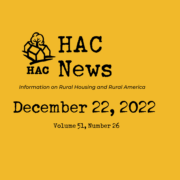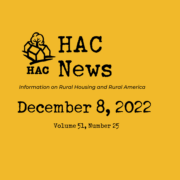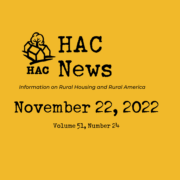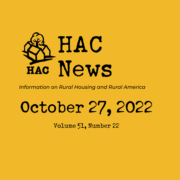HAC News: December 22, 2022
TOP STORIES
Final FY23 funding bill supports rural rental preservation, adds new manufactured housing program
The omnibus appropriations bill to fund the federal government in fiscal year 2023, released on December 20, holds most USDA and HUD housing programs near their FY22 dollar levels. The bill is expected to pass both houses of Congress and be signed by President Biden before the current continuing resolution expires on December 23.
The bill’s funding levels support rental preservation efforts, although the measure does not decouple (separate) Section 521 Rental Assistance from USDA Section 514 and 515 mortgages, as the administration’s budget requested. It substantially increases USDA’s Section 538 rental housing loan guarantees, which are used for preservation as well as new construction, from $230 million in FY22 to $400 million in FY23. Section 515 direct rental housing loans receive a smaller increase, from $50 million this year to $70 million next year, but the Section 514 farm labor housing loan program drops from $28 million to $20 million, while Section 516 grants hold steady at $10 million. USDA’s Community Facilities grant program drops from $40 million to $25.3 million. zero, presumably because over An additional $325 million in CF grants will be distributed as Congressionally Directed Funding (earmarks). Another portion of the omnibus adds $50 million in CF grants to repair essential facilities in places where federally declared disasters occurred in 2022. More details on the USDA programs are posted on HAC’s website. [Corrections in red made on March 30, 2023.]
In the HUD portion of the omnibus, HOME, CDBG, tenant vouchers, and most other HUD programs remain close to FY22 levels. The bill increases the SHOP and Rural Capacity Building programs by a modest $1 million each and raises the Tribal VASH veterans voucher program from $5 million to $7.5 million, but cuts HUD’s veterans housing rehab program from $4 million in FY22 to $1 million in FY23. The new $225 million manufactured housing program can be used outside manufactured home communities or in communities with long-term affordability provisions, for a variety of repair, preservation, and infrastructure activities, as well as replacement of pre-1976 homes. More details on this and other HUD programs are posted on HAC’s website.
The omnibus does not include tax legislation that would have adjusted the Low Income Housing Tax Credit program and extended the Child Tax Credit.
Rural homelessness increased from 2020 to 2022
Homelessness rose nationwide by 0.4% from 2020 to 2022, HUD reports, but the increase was 5.7% in largely rural Continuums of Care, the largest growth rate among geographies. While the national rate of change included a 1.6% drop in sheltered homelessness and a 3.5% increase in people experiencing homelessness without shelter, the proportions were reversed for largely rural CoCs. There, sheltered homelessness increased by 10.4% and unsheltered dropped by 0.3%. Nationally, rates of homelessness also increased for individuals and for people who had chronic patterns of homelessness. Homelessness decreased for veterans, families with children, and unaccompanied youth. Black and Indigenous people continue to be overrepresented among those experiencing homelessness. These are among the findings published in Part 1 of HUD’s most recent annual assessment of homelessness, which provides estimates for a single night in January 2022. HUD attributes the low increase in the rate of overall homelessness to the “robust federal response” to the housing crisis that resulted from the coronavirus pandemic.
Capacity building and capital access are focus of HAC comments on community investment
On December 19 HAC responded to a request for comments from a new Interagency Community Investment Committee representing several agencies including USDA and HUD. ICIC sought public input on ways the agencies can promote economic conditions and systems that reduce racial disparities and produce stronger economic outcomes for all communities. HAC’s response encourages them to support capacity building for local organizations, provide equitable access to capital for rural America, address rural needs – particularly in persistent poverty areas – directly, accelerate interagency coordination and sharing of best practices, and improve data and information accuracy and availability.
Happy holidays from HAC!
“Home” takes on special meaning during the holiday season: a place to gather with friends and family, or just to recharge. HAC wishes everyone in rural America a safe, healthy, and affordable place to call home.
HAC’s offices will be closed from December 26 through January 2.
RuralSTAT
In 2022, families with children experiencing homelessness comprised larger shares of the homeless populations in largely rural (30%) and largely suburban (32%) Continuums of Care than in major cities (26%) or other largely urban CoCs (21%). Source: HUD’s 2022 Annual Homeless Assessment Report to Congress.
OPPORTUNITIES
HAC’s Affordable Housing for Rural Veterans initiative opens
HAC’s Affordable Housing for Rural Veterans initiative supports local nonprofit housing development organizations that meet or help meet the affordable housing needs of veterans in rural places. Grants typically range up to $30,000 per organization and must support bricks-and-mortar projects that assist low-income, elderly, and/or disabled veterans with home repair and rehab needs, support homeless veterans, help veterans become homeowners, and/or secure affordable rental housing. AHRV is funded through the generous support of The Home Depot Foundation. Applications are due January 23. Register here for a January 11 webinar about this initiative. For more information and the application package, please visit HAC’s website.
HAC seeks consulting partner to assist with strategic plan
Are you a strategic consultant passionate about working with CDFIs, nonprofits, and/or rural communities? HAC invites you to submit a proposal for our strategic planning process! HAC seeks a consultant to support the organization and our stakeholders in the creation of a three-to-five-year strategic plan. Applications are due January 11. For more details, review the RFP on HAC’s website. Contact strategic@ruralhome.org with questions.
Grants offered for hazard mitigation revolving loan funds
FEMA’s new Safeguarding Tomorrow Revolving Loan Fund Program will make grants to states and Tribal governments to capitalize revolving loan funds that will help local governments reduce risks from disasters and natural hazards, and other related environmental harm. Applications are due April 28. For more information, contact FEMA staff, askcsid@fema.dhs.gov.
Family Unification Program funding preview published
HUD has published a preview of the FY22 Family Unification Program notice of funding opportunity. It expects the final NOFO will be issued on grants.gov in March and is making the preview available to give interested applicants more time to review it, submit questions, and prepare applications. For more information, contact Ryan E. Jones, HUD, 202-402-2677.
CAPITOL HILL
Disaster resilience zones to be designated
The Community Disaster Resilience Zones Act of 2022, signed into law by President Biden on December 20, requires FEMA to assess the risk of natural hazards across the United States based on community exposure and resiliency. The census tracts receiving the highest hazard risk ratings in each state will be designated as community disaster resilience zones. States, Tribal governments, and local governments will be eligible for FEMA assistance for resilience or mitigation projects benefiting those zones. Residents displaced by such projects will receive comparable replacement housing.
REGULATIONS AND FEDERAL AGENCIES
New national plan aims to decrease homelessness 25% by 2025
All In: The Federal Strategic Plan to Prevent and End Homelessness, released by the U.S. Interagency Council on Homelessness, focuses on developing solutions in the form of housing and supports, homelessness response, and prevention based on equity, data, and collaboration. The plan acknowledges that tailored guidance will be needed to meet its goals in rural, remote, and Tribal areas.
HUD seeks feedback on CDBG Disaster Recovery
HUD requests public comment on ways to improve the CDBG-DR program. Because the program does not receive regular appropriations and Congress authorizes funding only after a specific disaster, HUD has not had standardized requirements that can be used to deploy funds quickly. One comment request addresses the methodology HUD uses to allocate funds. The other asks how HUD can modify, expand, streamline, or remove CDBG-DR rules and requirements. Comments are due February 21. For more information, contact Jessie Handforth Kome, HUD, 202-708-3587 (phone), 202-708-0033 (fax).
CFPB revises threshold for lenders to report mortgage activity
The Consumer Financial Protection Bureau is reinstating a requirement that lenders who make at least 25 closed-end mortgage loans for two consecutive years must report data under the Home Mortgage Disclosure Act. A 2020 CFPB rule that raised the threshold to 100 loans was vacated by a court order in a lawsuit filed by consumer organizations. CFPB will not take enforcement actions against lenders with between 25 and 100 closed-end mortgage loans for data collected in 2022, 2021, or 2020. For more information, contact Jaclyn Maier or Alexandra Reimelt, CFPB, 202-435-7700, or submit a question online.
HUD finalizes three Buy America waivers
HUD has issued final versions of three waivers it proposed in November related to the Buy America preference enacted in 2021, which requires recipients of funding from HUD and other federal agencies to use iron, steel, manufactured products, and construction materials from the U.S. The waiver notices indicate more guidance is forthcoming. For more information, contact Joseph Carlile, HUD, 202-402-7082.
Previous HUD waivers cover all funding obligated by HUD on or before November 14, 2022 and HUD funding to Tribes and Tribal entities before May 14, 2023.
The de minimis and small grants waiver, effective on November 23, 2022, applies to “infrastructure projects” whose total cost falls under the Simplified Acquisition Threshold for federal procurement, currently $250,000. It also applies to de minimis portions of infrastructure projects. The notice does not explain what is considered to be infrastructure.
The exigent circumstances waiver applies when there are exigent circumstances, particularly related to maintenance, rehabilitation and repair activities at affordable housing and community development projects. It also took effect on November 23.
The phased implementation waiver enables HUD to implement the Buy America preference first in the CDBG formula grant program, by waiving it for all other HUD funding obligated through February 21, 2023.
Multifamily housing goals set for Fannie Mae and Freddie Mac
The Federal Housing Finance Agency used a new methodology to establish benchmarks for Fannie Mae’s and Freddie Mac’s purchases of mortgages for affordable multifamily housing for 2023 and 2024.
Public charge resources offered as new rule takes effect
U.S. Citizenship and Immigration Services has issued policy guidance and a new form related to the public charge rule for noncitizens, adding to its other resources. A revised regulation was issued in September and takes effect on December 23, focusing on receipt of cash assistance or long-term institutionalization and excluding housing aid from the determination whether a noncitizen is likely to become a public charge. Resources for communities (in several languages) and for advocates are also available from the Protecting Immigrant Families coalition.
PUBLICATIONS AND MEDIA
Opioid settlement distribution formulas result in less financial support for rural communities
The opioid epidemic severely affected rural communities. However, the allocation plans from multiple states for the $26 billion national settlement rely partly on county population totals. As a result, some rural communities in significant need of recovery housing, treatment facilities, and professionals are not receiving the funding they need to address the opioid epidemic.
Pennsylvania housing lower quality in rural places than in urban
Using a definition of rural municipalities developed by the Center for Rural Pennsylvania and a housing quality index, researchers found that, on average, the quality of rural housing in the state was lower than that of urban housing. Rural residences were more likely to burn coal or coke as heating fuel, less likely to have phone or high-speed internet, and more likely to have incomplete plumbing and kitchens. Their report, Assessment and Analysis of Housing Quality and Policies in Rural Pennsylvania, shows that characteristics such as income, education, marital status, and race all correlated with housing quality. The research also included an examination of municipal property maintenance codes; those findings are summarized in a Philadelphia Inquirer article titled Almost 90% of Rural Pennsylvania Municipalities Lack Property Upkeep Rules.
Article summarizes status of broadband in affordable rural housing
Many factors contribute to difficulties in increasing rural broadband access, according to an overview offered in a post from the Pew Trusts’ Broadband Access Initiative. Broadband Access Still a Challenge in Rural Affordable Housing concludes that more subsidies and government funding are needed to encourage providers to serve communities.
HAC
HAC seeks Portfolio Manager, Self-Help Housing and Housing Specialist – Native American Communities
- The Portfolio Manager, Self-Help Housing is responsible for the overall asset management, monitoring and reporting for an assigned portfolio of primarily self-help housing loans made to entities engaged in affordable housing activities in rural communities throughout the United States. This position is eligible for telecommuting.
- The Housing Specialist – Native American Communities is responsible for providing direct technical assistance, coaching, and training to tribal communities, tribal housing departments, tribal housing authorities, and nonprofit organizations serving tribal communities. Travel is required. This position is eligible for telecommuting.
National Rural Housing Conference set for October 2023
Mark your calendars and save the date! HAC’s National Rural Housing Conference will be held October 24-27, 2023 in Washington, DC and online.
Need capital for your affordable housing project?
HAC’s loan fund provides low interest rate loans to support single- and multifamily affordable housing projects for low-income rural residents throughout the U.S. and territories. Capital is available for all types of affordable and mixed-income housing projects, including preservation, new development, farmworker, senior and veteran housing. HAC loan funds can be used for pre-development, site acquisition, site development, construction/rehabilitation and permanent financing. Contact HAC’s loan fund staff at hacloanfund@ruralhome.org, 202-842-8600.
Please note: HAC is not able to offer loans to individuals or families. Borrowers must be nonprofit or for-profit organizations or government entities (including tribes).
Want to reprint a HAC News item?
Please credit the HAC News and provide a link to HAC’s website. Thank you!










